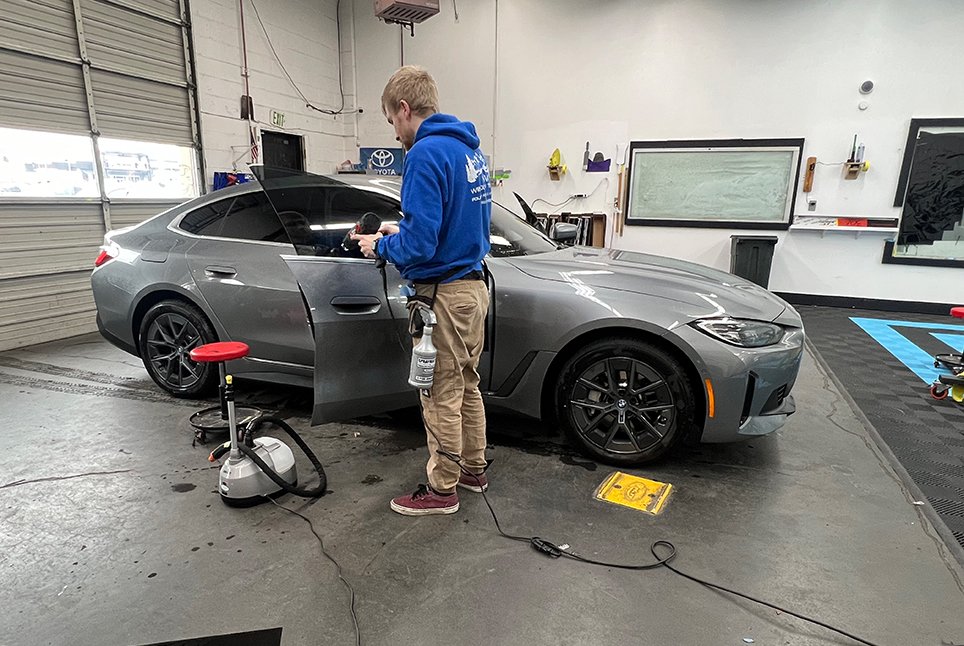Custom Vehicle Window Tinting Providers for a Streamlined and Stylish Look
Custom Vehicle Window Tinting Providers for a Streamlined and Stylish Look
Blog Article
Home Window Tinting Rules and Standards: What You Required to Know Before Tinting Your Cars And Truck
Prior to continuing with home window tinting for your vehicle, it is essential to acquaint yourself with the varied legislations and guidelines that govern this method throughout various states. These guidelines dictate the allowable levels of tint darkness, typically gauged by visible light transmission (VLT) portions, and consist of details stipulations for front windshields aimed at making certain roadway safety.
Introduction of Home Window Tinting Regulations
Window tinting legislations are often based on variant throughout different jurisdictions, reflecting local regulations and safety factors to consider. These legislations determine the acceptable levels of color darkness and reflectiveness on lorry home windows, ensuring that motorists maintain adequate visibility while likewise protecting versus hazardous UV rays and heat.
Many policies identify window tinting based upon the Visible Light Transmission (VLT) portion, which shows the amount of light that can pass via the home window. Usually, reduced VLT percentages symbolize darker colors. Legislations usually set apart between the front, side, and back home windows, with more stringent constraints related to the front windscreen to enhance safety and security for both the chauffeur and other roadway customers.
Compliance with home window tinting regulations is essential, as infractions can result in penalties, necessary elimination of the tint, and prospective boosts in insurance policy premiums. It is important for vehicle proprietors to familiarize themselves with local regulations before proceeding with window tinting installments.
State-by-State Tint Rules
Recognizing the particular window tinting guidelines in each state is vital for lorry owners looking for to follow the regulation. Each state in the U.S. has actually established its own collection of policies regulating window tinting, which can differ substantially. These guidelines often dictate the allowable levels of tint darkness, the kinds of home windows that can be tinted, and any type of clinical exceptions that might use.
As an example, states like The golden state have rigorous constraints on color darkness for front home windows, while others, such as New Mexico, may allow darker colors. Additionally, particular states mandate certain exposure portions for various home windows, consisting of the windscreen, front side windows, and back home windows. It is essential for car proprietors to acquaint themselves with their state's legislations to prevent prospective penalties or fines.
Additionally, some states may need a qualification sticker to be positioned on tinted windows, suggesting compliance with state laws. Failing to stick to these policies not only risks legal consequences but can additionally affect safety and security and presence while driving. Therefore, vehicle owners must conduct thorough research or speak with local authorities to make certain full understanding and conformity with state-by-state tint regulations.
Allowed Color Levels and Types
Numerous lorry proprietors might be stunned to learn that enabled tint levels and types differ widely throughout various states. Each state has developed its very own policies concerning the permissible darkness and reflectivity of home window tint, commonly gauged by Visible Light Transmission (VLT) percents. VLT describes the quantity of light that can pass with the colored windows; thus, a reduced portion shows a darker color.

In addition, the sorts of tint materials enabled can differ, with some states forbiding mirror-like or metal coatings. It is necessary for lorry proprietors to acquaint themselves with their state's specific laws to make sure conformity. Non-compliance can lead to fines, mandatory removal of the color, or various other lawful effects, making it important to recognize these policies prior to continuing with installation.
Medical Exemptions for Tinting
While not all states give allowances for medical exceptions relating to home window tinting, those that do recognize the necessity for certain people to improve presence and convenience because of clinical conditions. Various clinical conditions, such as lupus, skin cancer, and specific eye disorders, can make individuals specifically delicate to sunshine. These people might require darker tints to protect themselves from damaging UV rays and glow.

It is important to note that also with a medical exemption, there might still be constraints on the level of color allowed. Conformity with state laws makes certain that individuals are both safeguarded and within lawful limits. Those considering medical exceptions must call their local Division of Motor Cars or equivalent authority to comprehend the demands and treatments required to apply for an exemption successfully.
Charges for Non-Compliance
Falling short to adhere to home window tinting legislations can bring about considerable penalties, which differ by state. Police are encouraged to release citations for cars that do not stick to the defined tinting policies. These fines commonly consist of fines, which can vary from moderate total up to a number of hundred dollars, depending upon the severity of the offense and the state in inquiry.
In some territories, duplicated offenses may result in escalating fines or extra charges, such as mandatory court appearances. Furthermore, non-compliance may necessitate the removal of prohibited tinting, usually at the proprietor's cost. In severe situations, habitual offenders might encounter suspension of their automobile enrollment up until conformity is accomplished.
Additionally, insurance coverage effects may develop from getting numerous citations for navigate to this website home window tint infractions. Insurance firms might watch such offenses as a sign of riskier behavior, possibly bring about raised costs or problem in protection.
To stay clear of these penalties, it is crucial for vehicle owners to acquaint themselves with their local window tinting legislations and make certain that their vehicle complies (Window Tinting). This proactive strategy not just prevents legal implications however also advertises road safety
Verdict

The majority of policies identify window tinting based on the Visible Light Transmission (VLT) percent, which suggests the quantity of light that can pass via the home window. Conformity with home window tinting laws is vital, as violations can result in fines, required elimination of the color, and possible boosts in insurance policy costs.Recognizing the details home window tinting policies in each state is crucial for automobile proprietors looking for to conform with the law. These regulations often dictate the allowable levels of tint darkness, the types of windows that can be tinted, and any medical exemptions that might apply.
For instance, states like The golden state have rigorous constraints on color darkness for front home windows, while others, such as New Mexico, may enable darker colors.
Report this page